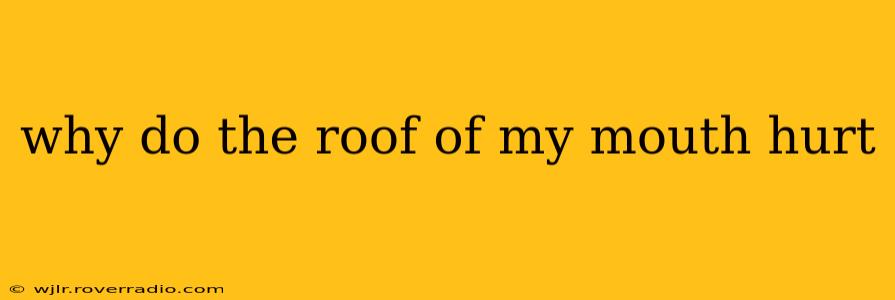A sore roof of the mouth, medically known as the palate, is a common complaint with various potential causes. Understanding the underlying reason is crucial for effective treatment and relief. This guide explores the most frequent culprits and offers advice on when to seek professional medical attention.
What are the common causes of a sore roof of the mouth?
Several factors can contribute to a painful palate. These range from minor irritations to more serious underlying conditions. Let's delve into the most common causes:
Minor Irritations and Injuries:
- Hot food or drinks: Burning your mouth on something too hot is a frequent cause of temporary palate pain. The discomfort typically subsides within a few days.
- Sharp foods: Eating something with a sharp edge, like a cracker or a bone fragment, can cause a small cut or abrasion on the palate, leading to pain and discomfort.
- Dry mouth: A lack of saliva can leave the mouth feeling dry and increase sensitivity, making the palate more prone to irritation and pain. Dehydration is a common cause of dry mouth.
- Dental work: Recent dental procedures, such as fillings, extractions, or dentures, can irritate the palate and cause temporary pain.
- Mouthguards or braces: These appliances can rub against the palate, causing irritation and soreness.
- Oral piercings: Tongue or lip piercings can sometimes inadvertently cause injury to the palate.
Infections:
- Oral thrush (candidiasis): This fungal infection often manifests as white patches on the tongue, cheeks, and palate, accompanied by pain and burning. Individuals with weakened immune systems are more susceptible.
- Canker sores (aphthous ulcers): These small, painful ulcers can appear on the soft tissues of the mouth, including the palate. While the exact cause is unknown, stress, hormonal changes, and nutritional deficiencies are potential contributing factors.
- Herpes simplex virus (HSV): Although more commonly associated with cold sores on the lips, HSV can sometimes affect the palate, causing painful blisters.
Medical Conditions:
- Burning mouth syndrome: This chronic condition causes a persistent burning sensation in the mouth, often affecting the palate, tongue, and lips. The cause remains unclear, but hormonal changes, nutritional deficiencies, and allergies are potential contributing factors.
- Allergic reactions: Certain foods or medications can trigger allergic reactions, resulting in oral inflammation and pain.
- Autoimmune diseases: Some autoimmune disorders can affect the oral mucosa, leading to inflammation and pain in the palate.
- Gingivitis or periodontitis: Although primarily affecting the gums, severe gum disease can sometimes spread to the palate, causing pain and inflammation.
- Radiation therapy: Radiation therapy to the head and neck region for cancer treatment can damage the oral tissues, leading to pain and dryness in the mouth.
How long does a sore roof of the mouth last?
The duration of palate pain depends entirely on the underlying cause. Minor irritations usually resolve within a few days. However, infections or more serious medical conditions may require longer treatment and could persist for several weeks or even months.
When should I see a doctor about a sore roof of my mouth?
It's essential to seek medical attention if the pain:
- Is severe or persistent: Pain lasting longer than a week or accompanied by significant discomfort warrants a doctor's visit.
- Is accompanied by other symptoms: Fever, swelling, difficulty swallowing, or bleeding should prompt immediate medical attention.
- Doesn't respond to home remedies: If over-the-counter pain relievers or home treatments fail to alleviate the pain, professional help is necessary.
- Recurs frequently: Repeated episodes of palate pain could indicate an underlying medical condition requiring diagnosis and treatment.
How can I relieve a sore roof of my mouth?
For minor irritations, these home remedies can provide relief:
- Saltwater rinse: Gargling with warm salt water can help cleanse the mouth and soothe irritation.
- Over-the-counter pain relievers: Nonsteroidal anti-inflammatory drugs (NSAIDs) like ibuprofen can help reduce pain and inflammation.
- Cold compresses: Applying a cold compress to the affected area can help numb the pain and reduce swelling.
- Avoid irritating foods and drinks: Steer clear of hot, spicy, acidic, and rough foods and drinks until the pain subsides.
- Stay hydrated: Drinking plenty of water helps maintain saliva production and keeps the mouth moist.
This information is for general knowledge and does not constitute medical advice. Always consult with a healthcare professional for diagnosis and treatment of any medical condition. They can accurately determine the cause of your palate pain and recommend the most appropriate course of action.
